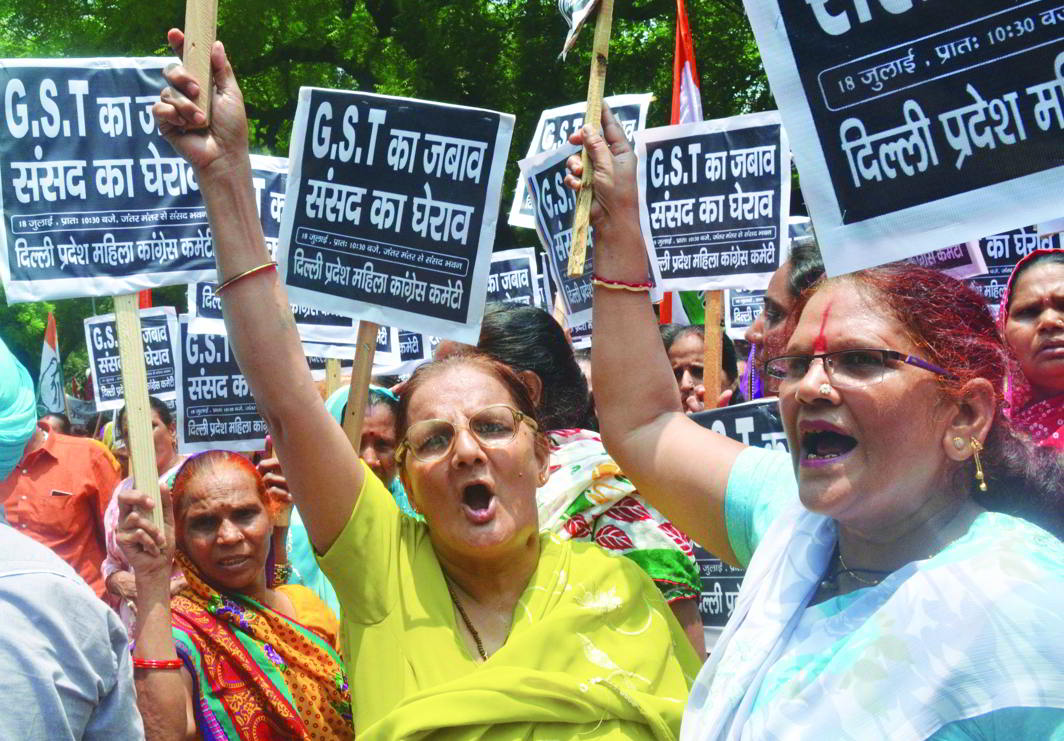Above: Restaurant guests and shoppers are hapless consumers to whom the GST rate cut benefit has not been passed on. Photo: Kh Manglembi Devi
While the Authority is meant to ensure that the benefits of the tax regime are passed on to the consumer, it must apply its rules with wisdom, discretion and restraint so as to avoid misuse and harm to industry
~By Sumit Dutt Majumder
The GST was meant to reduce tax on consumers. It contained a slew of measures, such as removing cascading of taxes and reducing tax compliance, transportation and other logistics costs. Removal of many taxes was to be achieved by providing a seamless flow of input tax credit to the supply of goods and/or services throughout the supply chain. The availability of input tax credit at every stage of flow of the supplies was to ensure that the incidence of tax was only on the value addition.
All these measures were to result in a drastic reduction of tax and hence cost of goods and/or services, irrespective of the GST rate. Even GST rates, it was assured, would be lower than the total rates of pre-GST indirect taxes like central excise, service tax, state VAT, entry tax, and so on. This was to be made possible by increasing the tax base.
Naturally, the government expected that the benefit of reduction on GST rates and other measures would be passed on to the consumer, thus bringing down the price of goods and services under the GST regime. The government felt that if manufacturers, dealers, and others did not pass on this benefit and made extra profit, it must be returned to the consumer or society through the Consumer Welfare Fund.
ANTI-PROFITEERING AUTHORITY
With these objectives in mind, the Union cabinet on November 16, 2017, formally approved the setting up of the National Anti-Profiteering Authority (NAPA), with an overarching mandate to ensure that the reduction in tax rates and benefit of input tax credit get passed on to consumers by way of lower prices. The cabinet has also cleared the creation of posts of chairman and members of the Authority. A five-member panel headed by the cabinet secretary has also been entrusted with the task of selecting its chairman and members.

The whole process has been expedited in the backdrop of the GST Council’s decision on November 10 to lower the GST rates on about 200 items. The grievance of people that restaurants were not passing on the benefit of the rate cut also had a role to play. Thus, Section 171 of the CGST Act was brought in. It explains that any reduction in the rate of tax on any supply or any benefit of input tax credit will have to be passed on to consumers by way of a commensurate reduction in the price of the goods or service.
The constitution and functioning of the Anti-Profiteering Authority have been further codified through 16 rules, namely, Rules 122 to 137 of the Central GST Rules, 2017. Based on the authorisation given in Section 171, the government has come up with the setting up of an Authority. Rule 122 explains the constitution of the Authority, which will have four technical members and a chairman. The tenure of the Authority will be two years, unless the GST Council recommends otherwise. Rule 123 explains the constitution of a standing committee and a state-level screening committee in each state. Rules 124 and 125 explain the appointment, salary and other terms and conditions of service. Rules 126, 127, 128 and 129 explain elaborately the “Power to determine the methodology and procedure”, “Duties of the Authority”, “Examination of application by the Standing Committee and Screening Committee” and “Initiation and conduct of the proceedings”, respectively.
SCREENING COMPLAINTS
The process will start with the receipt of a complaint application, along with evidence from the applicant about a particular supplier not passing on the benefit and making undue profit. The applicant can be a supplier, a recipient of goods and services or “any other person”, which means it can also be a consumer welfare activist.
Complaints of a local nature will be first examined by the state-level screening committee. In deserving cases, it will forward the application with its recommendations to the standing committee which will examine such reports and complaints received directly. If the case is fit for further investigation, it will direct it to the Director General (DG) of Safeguards under the Central Board of Excise and Customs. The DG will follow the principles of natural justice and furnish its investigation report to the Authority within three months. Rules 126 to 129 cover all these processes. While Rules 130 to 132 deal with confidentiality of information, Rules 133 to 137 explain the decision-making process in the Authority.
This process will start with the Authority giving a hearing to the concerned parties and then determining whether the registered person has passed on the benefit to the consumer. If he hasn’t, the said person will be ordered to reduce the prices of the goods or services. He will also be ordered to return to the recipient an amount equivalent to that not passed on, along with interest of 18 percent. Otherwise, the said amount will be deposited in the Consumer Welfare Fund. There will also be a penalty and the registration too can be cancelled.

An order of the Authority, which will be by majority rule, will have to be complied with immediately. Help will be sought from authorities dealing with central GST, states’ GST or Union Territory GST to monitor implementation of the order.
TRADE & INDUSTRY
Apprehensions were expressed by trade and industry after the release of the rules June-end that GST would bring back “Inspector Raj” and its attendant inconveniences, and that the power to penalise and cancel registration would lead to chaos and disruption in business. While responding to these apprehensions, the finance minister and the revenue secretary gave assurances that these provisions would be rarely used and were merely deterrents. These assurances will have to be translated into clear-cut and unambiguous guidelines, particularly as the rules do not say so or give that impression. These rules will be applicable to all suppliers and recipients in the GST regime.
The discretion as to which cases would be subject to these provisions must not be thrust upon the field officers; it will be too risky for them to apply discretion. Therefore, the guidelines and notifications must clearly lay down as to which type of cases should be investigated and which are to be left alone. The help and support of consumer welfare forums and their activists may be considered for this purpose.
The other important requirement is that the government must soon notify the methodology to be used to determine the extent of profiteering and decide whether it is undue or illegitimate. In this context, it must be remembered that it is but logical that every business would strive for profit. How-ever, what is objectionable is that it must not pocket all the gains from GST and must pass on the extra benefit to the consumer.
As for trade and industry, there are apprehensions about operational issues and implementation challenges as to how to determine the quantum of the “commensurate reduction” in prices that are not being passed on to consumers. While these provisions are essential from the point of view of consumers in order to keep prices in check, the industry wants sufficient safeguards against misuse of this power.
Thus, these provisions need delicate handling. Indeed, the anti-profiteering provisions are double-edged weapons unless applied with wisdom, discretion and restraint. In order to dispel the apprehensions of industry while at the same time assuring consumers of a fair price, the GST Council must come out with detailed guidelines on all these issues without delay.
—The author is former chairman, CBEC and the author of the book,
Know your GST—GST Unraveled

